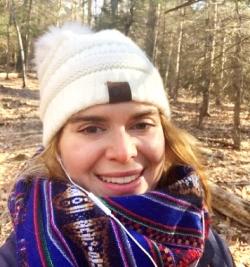
Meaghan (Meg) McDermott calls her Worcester office “home base” but loves that her work allows her to travel throughout the large county for club meetings and myriad programs. The UMass 4-H educator is an enthusiastic cheerleader for 4-H, which is no surprise since she cut her teeth in Norfolk County’s 4-H program as a youngster. And her family has always been connected to animals and the land: McDermott’s grandmother and father ran an equestrian club for 30 years with a stable of horses, where she was a frequent rider. Her parents now operate a garden center where she continues to work part time. These early experiences ingrained in McDermott the values and connection to place that are core to the 4-H mission.
McDermott has fully embraced the 4-H lifestyle as she works with youth ages 5-18, adult volunteers, community partners, and other Extension staff to provide participants with fun, hands-on, and engaging programs. Her typical day (“there isn’t one!” she insists) has her dashing from club meetings to check in with new volunteers and then facilitating virtual programs in the evening. She is keenly interested in programs within the fields of horticulture and animal science. “My favorite part of working with kids is watching them master a new skill or discover a new passion,” she says.
Before arriving at UMass, McDermott served as an assistant director of academic advising at Boston College for two and a half years. In this role, she managed a case load of 35 high-needs students (mostly first-generation college students), provided general advising to 3,200 first year students, and developed a needs assessment that helped to perceptions of the efficacy of first year advising interventions and services.
After Boston College, she served as a 4-H animal science program manager in New York’s Columbia and Greene counties working with 4-H club leaders and volunteers, agricultural commissions, and several specialists in the animal science field. These positive working relationships enabled McDermott to hit the ground running in Massachusetts.
Turning a Highly Interpersonal Setting Into A Virtual Option
Although it is not easy to begin a new job at the beginning of a worldwide pandemic, McDermott did just that, starting her job in the spring of 2020. She says, “In some ways the silver lining has been finding new ways to communicate and offer programs. Real, positive actions have come out of that. I hope in an uncertain world, we can continue to blend technical efforts with new ways in which we have transitioned.”
Two areas have been particularly challenging during the pandemic: attracting new members and starting new clubs. Some new members waited to join during Spring 2021, when it was warmer and safer to be with others outside. To alleviate safety concerns, McDermott organized meetings outside or in spaces where members were able to socially-distance.
To further promote the accessibility of 4-H work, McDermott teamed up with Tom Waskiewicz, 4-H Extension Educator, to create the Horticulture Gardening Program, an online program that provides virtual programs infused with gardening lessons. The workshop-based program introduces participants to various educators from Extension who discuss horticulture, gardening, growing their own food, and the importance of food systems.
Both Waskiewicz and McDermott grew up on farms, so it is natural for them to inspire the next generation grounding them in personal growing experiences. The program’s online sessions are seasonally timed to coincide with growing season topics such as with soil education, summer gardens and vegetable challenges, and the late-summer harvest. The program kicks off each fall, preparing 4-Hers for the winter while putting gardens to bed. Lessons describing soil preparation for cover crops are designed to be specific to the type of gardens being planted (raised beds, long direct sow rows, etc.). Workshops on planting winter rye, peas, barley, and other crops are tailored to the specific nutrient needs of different soil types. Waskiewicz and McDermott note that 4-H members as young as 5 and as old as 18 are especially excited about these online offerings.
Welcoming Everyone
Throughout the pandemic, McDermott finds that communication and keeping her members engaged is the key to keeping them on track and within the 4-H mindset. And she makes staying engaged as easy as possible: During their monthly fair committee, advisory council, and state dog committee meetings, she offers meetings in-person with an option for participants to "zoom in" for those unable to attend in person. Other 4-H events are specifically designed flexibly, so that in-person events are able to shift to virtual activities within a day if needed when Covid-19 concerns are elevated.
McDermott has a strong philosophy about education: to meet all 4 -H student members and volunteers “where they are,” and provide the support and resources necessary to help get them to where they want to go. She mentions that this kind of support should be tailored to individuals based on race, socio-economic status, and other personal factors. “I believe that everyone deserves access to all that 4-H has to offer,” she says. “How we as a statewide staff provide hands-on positive youth development opportunities changes based on the needs of our participants.”
This year’s Worcester County 4-H Fair was organized by McDermott with the assistance of many passionate volunteers. They were delighted to have 55 youth exhibits featuring dairy and beef cattle, sheep, swine, goats, rabbits, and poultry. Many youth participants also chose to submit commodity entries such as baked goods, floral arrangements, sewing and felting projects, photography, horticulture items, and more.
What is McDermott’s guiding motivation in working with 4-H youth? She says unequivocally, “Regardless of the field they go into, it is gratifying to help build well-adjusted, self-confident kids.”